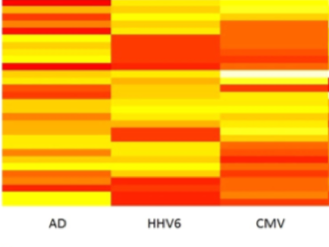Researchers from GlaxoSmithKline found a significant overlap in differentially expressed genes shared by those with herpesvirus infections, Alzheimer’s and Parkinson’s. On the other hand, there was no significant overlap between herpesviruses and Type 2 diabetes or Huntington’s disease.
Multiple differentially expressed genes were shared between patients with EBV, HHV-6B and CMV infections, and those with two neurological conditions, including SESN3 which has a genetic association for increased Alzheimer’s (AD) risk. In addition, patients with herpesviruses shared expression in the oxidative stress defense system and LRRK2 pathways. The Glaxo scientists also identified novel drugs that could be repurposed to target the shared pathways that were identified.
The authors maintain that their results provide evidence of the shared involvement of oxidative stress mechanisms in the pathologies of these conditions, through the activation of the Sirtuin and PGC-1-alpha pathways. LRRK2, a kinase mutated in PD cases, modulates inflammation and plays a role in promoting inflammation in microglial cells.
The group found that 5 differentially expressed genes (TIMP2 BCL6, GYG1, RBCK1, and CIRBP) were shared between all three viruses and Parkinson’s (PD). Only TIMP2, which is associated with neuroprotection, was previously linked to PD, neurodegeneration, or neuroinflammation.
Analysis of public compounds used in already approved drugs targeting genes identified as shared between AD/PD and CBV/EMV/HHV-6 host response was performed. This identified compounds already in use and known to be safe that could possibly be repurposed as effective antivirals. They mapped 401 differentially expressed genes against the ChEMBL databased and identified 55 drug target pairs for 20 genes. Of these, 14 already had published evidence of neuro-protection to AD or PD through multiple mechanisms.
The patients used to study HHV-6 were children with fever and HHV-6 viremia, presumably all HHV-6B. Fifteen drug targets were found for HHV-6B, including the antiviral ganciclovir, pentoxifylline (used to great peripheral artery disease) and two drugs used in Parkinson’s: minaprine and pergolide.
The authors conclude that their research adds to the evidence for the role of immune dysfunction and common herpesvirus infections, in the progression of neurodegenerative diseases.
Read the full paper: Costa Sa

Heatmaps of subset of CMV, EBV and HHV-6 differentially expressed genes shared with AD and PD.Input caption text here. Use the block's Settings tab to change the caption position and set other styles.

